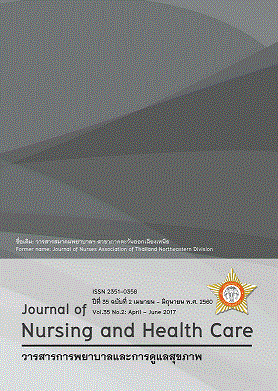การสนับสนุนการเลิกบุหรี่ในกลุ่มเสี่ยงสูงต่อเบาหวาน Family and Community Experiences in Supporting People with Pre-diabetes for Quitting Smoking
คำสำคัญ:
การสูบบุหรี่ การสนับสนุนการเลิกบุหรี่ กลุ่มเสี่ยงสูงต่อเบาหวาน Smoking, supporting for smoking cessation, pre-diabetesบทคัดย่อ
บทคัดย่อ
กลุ่มเสี่ยงสูงต่อเบาหวาน คือบุคคลที่มีระยะการดำเนินโรคก่อนเป็นเบาหวาน เป็นประชากรขนาดใหญ่และมีแนวโน้มเพิ่มมากขึ้นทั่วโลก เกิดจากการสูญเสียหน้าที่ของตับอ่อนมากกว่าร้อยละ 80 ทำให้ร่างกายมีภาวะน้ำตาลสูงระดับกลาง (FBS 100-125 mg/dl) ร้อยละ 6.1 ถึง 9.2 กลายเป็นเบาหวานใน 25 ปี สามารถเกิดภาวะแทรกซ้อนต่อหัวใจ ตา ไต และเท้า เช่นเดียวกับผู้ป่วยเบาหวานปัจจัยที่มีผลต่อการดำเนินโรค คือ ภาวะโภชนาการเกินและการสูบบุหรี่ ซึ่งในประเทศไทยการควบคุมการสูบบุหรี่ยังไม่มีความชัดเจน และประชาชนมีข้อจำกัดทางสุขภาพด้านสังคม วิถีชีวิต และสภาพการทำงาน ดังนั้นจึงต้องอาศัยการสนับสนุนจากชุมชนในการเลิกบุหรี่
รายงานวิจัยนี้เป็นส่วนแรกของการวิจัยเชิงปฏิบัติการแบบมีส่วนร่วม ศึกษาสถานการณ์การสูบบุหรี่และการเลิกบุหรี่ในกลุ่มเสี่ยงสูงต่อเบาหวาน รวมทั้งศึกษาประสบการณ์การสนับสนุนการเลิกบุหรี่ของครอบครัวและชุมชน ผลการวิจัยมีข้อค้นพบ 4 ลักษณะ ได้แก่ 1) สถานการณ์การสูบบุหรี่ในกลุ่มเสี่ยงสูงต่อเบาหวาน พบว่าการสูบบุหรี่เกิดจากสาเหตุสำคัญ 2 ประการ คือ 1.1) พฤติกรรมการเสพติด ได้แก่ การติดนิโคติน นิสัยหรือความคุ้นชิน การติดใจในรส/กลิ่น และการพึ่งพิงทางจิตใจและ 1.2) เกิดจากปัจจัยกำหนดทางสุขภาพ ได้แก่ สภาพการทำงาน สังคมและสิ่งแวดล้อมในชุมชน 2) ประสบการณ์การเลิกบุหรี่ในกลุ่มเสี่ยงสูงต่อเบาหวาน พบว่ามีกลุ่มเสี่ยงสูงต่อเบาหวานสามารถเลิกบุหรี่ได้เป็นผลจากแรงจูงใจ ประสบการณ์ที่เคยเลิกบุหรี่ และการสนับสนุนจากครอบครัวและชุมชน 3) ประสบการณ์การสนับสนุนการเลิกบุหรี่ของครอบครัว พบว่าครอบครัวมีบทบาทสำคัญ 3 ประการ คือ เสริมสร้างแรงจูงใจ สร้างกติกา และสร้างบรรยากาศในครอบครัวเพื่อสนับสนุนการเลิกบุหรี่และป้องกันการสูบบุหรี่ซ้ำ และ 4) ประสบการณ์การสนับสนุนการเลิกบุหรี่ของชุมชนชุมชนมีบทบาทในการเลิกบุหรี่ใน 2 ลักษณะ คือ ทำหน้าที่เป็นจิตอาสาช่วยแหลือคนเลิกบุหรี่ และให้การสนับสนุนการเลิกบุหรี่ผ่านเครือข่ายต่างๆ
การรับรู้สถานการณ์ที่เกิดขึ้น ผ่านการแลกเปลี่ยนประสบการณ์และสะท้อนคิดของชุมชนร่วมกับกลุ่มเสี่ยงสูงต่อเบาหวานทั้งที่เลิกบุหรี่ได้สำเร็จและไม่สำเร็จช่วยให้ชุมชนเกิดการวิเคราะห์ตนเอง รับรู้ว่าการเลิกสูบบุหรี่เป็นเรื่องยากเนื่องจากข้อจำกัดทางสุขภาพของกลุ่มเสี่ยงเบาหวาน ปัจจัยสำคัญที่ผลต่อการเลิกบุหรี่ คือ แรงจูงใจ ทั้งแรงจูงใจภายใน ได้แก่ การมีเป้าหมายที่ชัดเจนและเข้มแข็งเป็นเครื่องยึดเหนี่ยว และการทบทวนตนเองถึงประสบการณ์เลิกบุหรี่ที่ผ่านมา รวมถึงแรงจูงใจภายนอก คือ การสนับสนุนจากครอบครัวและชุมชน
Abstract
Pre-diabetes is high risk group for diabetes, which are the large and growing population all over the world. It causes of over 80% loss of function of the pancreas if the body has high levels of glucose (FBS 100-125 mg / dl). Pre-diabetes will become diabetic in 25 years for 6.1 to 9.2 percent. These will cause to the complications in the heart, eyes, kidneys and feet same as those in patients with diabetes. Factors affecting the disease include over nutrition and smoking. In Thailand, the smoking cessation process is unclear, the health constraints on social are increasing, and lifestyle and working conditions are lacking. Therefore, it requires the support of the community to quit smoking.
This research is the first part of participatory action research. The study on the smoking situation and smoking cessation in pre-diabetes included experience in family and community smoking support. The research findings comprised of four aspects:
1) Smoking situation in pre-diabetes was found that smoking was caused by two main reasons: 1.1) addictive behavior including nicotine addiction, habit or familiarity, attracted to taste / smell and the psychological dependence; and 1.2) the health determinants were the working conditions, the environment, and the environment in the community.
2) Smoking cessation experiences in pre-diabetes was found that pre-diabetes quit smoking as a result of motivation, quitting smoking experience included family and community support.
3) Family smoking support experience was found that the family plays three important roles, which were: creating a family situation to support smoking cessation and preventing relapsed smoking.
4) Experience of smoking cessation support of community had played a role in smoking cessation in two aspects: community volunteer to help people quit smoking and community network to support smoking cessation.
Perception of the situation through the exchange of experiences and reflections of the community with high-risk groups on diabetes, both successful and unsuccessful quit smoking, helped the community to do self-analysis. They recognized that smoking cessation was difficult due to community health constraints and the major factor affecting smoking cessation was motivation.
Both internal motives and external motives strengths include a clear goal and a strong anchor and self-reflection on previous smoking cessation experiences, including external motivation is family and community support



